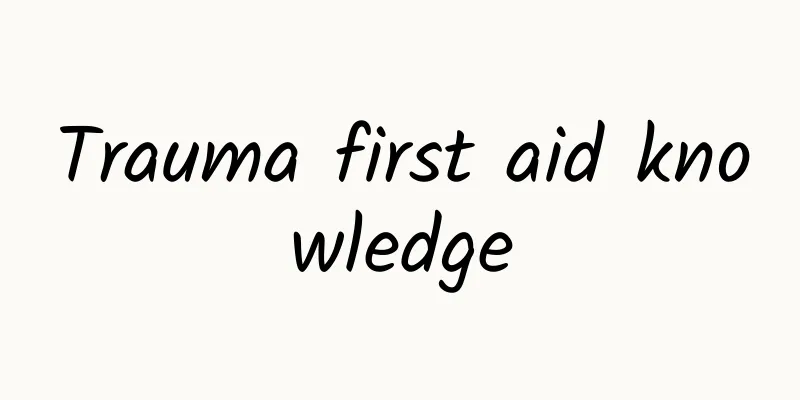Trauma first aid knowledge

|
Four techniques of trauma first aid: hemostasis, bandaging, fixation, and transportation. 1. Stop bleeding Commonly used methods of stopping bleeding: 1. Press: Use fingers or palms to press and stop bleeding; 2. Bandage: Cover with gauze or clean cloth and bandage to stop bleeding; 3. Filling: Use gauze or clean cloth to fill deep wounds; 4. Tie: Use a tourniquet. When using, you should choose one method or combine several hemostatic methods according to the specific situation to achieve the fastest, most effective and safest hemostasis purpose. Finger pressure artery hemostasis method: It is suitable for heavy bleeding in certain parts of the head and limbs. The method is to press the artery near the wound with your fingers, press the artery to the deep bone, and block the blood circulation. This is a simple and effective method of hemostasis that does not require any equipment, but because the hemostasis time is short, it often needs to be combined with other methods. 1. Finger pressure artery hemostasis method on the head and face. The hemostatic arteries on the head and face are shown in the figure. 2. Arterial pressure hemostasis method for the limbs. 3. Packing and compression to stop bleeding. 4. Tourniquet for hemostasis. It is used when there are major blood vessel injuries, large wounds, and heavy bleeding in the limbs. Precautions for using tourniquet: 1. Add padding 2. Record time 3. Relax slowly for 5 minutes every half hour. 4. Use acupressure to stop bleeding during relaxation. 5. The cloth tourniquet is inelastic, so be careful to prevent limb injuries. It is forbidden to use steel wire, rope, etc. as a tourniquet. 2. Bandaging Purpose of bandaging: 1. Stop bleeding 2. Anti-pollution 3. Protect tissues and internal organs Tip: Use local materials Dressing: Cover the wound with gauze, wrap the bandage around the limb with 4-5 layers under a certain pressure, tear the center of the bandage tail and tie a knot around the limb. The gauze should be thick enough and the covering area should be at least 3 cm larger than the wound. You can also use a triangular bandage, handkerchief, clean cloth, etc. to bandage and stop bleeding. Head wound The scalp has rich blood supply and bleeding is more frequent, often accompanied by skull fractures and craniocerebral injuries. Note: If there is leakage from the ears or nose, it indicates a skull base fracture. The ears and nostrils should not be blocked at this time. Treatment of foreign bodies in wounds: 3. Fixation On-site fracture fixation Limb manifestations after fracture 1. Severe pain 2. Local swelling 3. Limb deformity 4. Dysfunction Purpose of fixation: 1. Reduce secondary damage 2. Reduce pain 3. Powerful handling Fixed basic requirements: 1. Fixation should be reliable 2. Not too loose or too tight 3. Cross joints 4. Add padding to fractures and joint protrusions It is contraindicated to reduce fractures on site Neck fixation: 4. Transportation Correct handling 1. Evaluation after hemostasis and bandage fixation is completed 2. Pinto 3. Axis flip 4. Smooth movement 5. Can reduce the patient's pain 6. Prevent further damage Popular Science Doctor: Guo Linsen Workplace: Yangbu Town Central Hospital, Pingyu County, Henan Province |
<<: After “Yang Kang”, you need to pay attention to these things!
Recommend
Side effects of private parts whitening surgery
Many women are very concerned about the appearanc...
Women's full body check-up must do items
Women's Day is coming soon, and women in toda...
The half-moon on the nails will disappear during pregnancy
The white crescent is also called the half-moon m...
Why is the leucorrhea so thin?
Why is a woman's secretion so thin and watery...
Which type of women has the strongest sexual desire?
Many men feel powerless after reaching middle age...
What causes vaginal itching?
Nowadays, many women suffer from different gyneco...
Pharmacist's Antidote | Your hair is "suddenly gone"? How to save your hairline~
The hair that was thick and dense before has now ...
Can I get pregnant if I ejaculate inside you right after my period?
Many women believe that having sex after menstrua...
Increased bowel movement at 39 weeks of pregnancy
The frequency of bowel movements increases during...
Do these exercises to prevent pelvic fluid accumulation
Pelvic fluid effusion is formed during women'...
What kind of fish soup is best to drink after abortion
Having an abortion is a very helpless thing for m...
Take Chinese medicine for one month to supplement estrogen
We all know that if there is too little estrogen ...
Things to note before TCT examination
As we age, many organs of the body are changing, ...
How to read the results of cervical HPV test
The most feared thing for women is suffering from...









